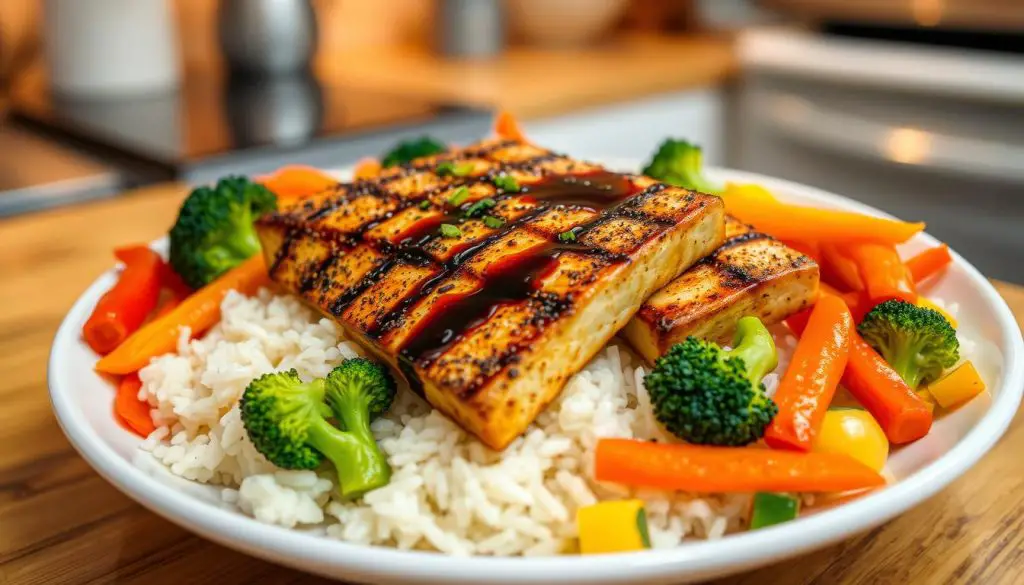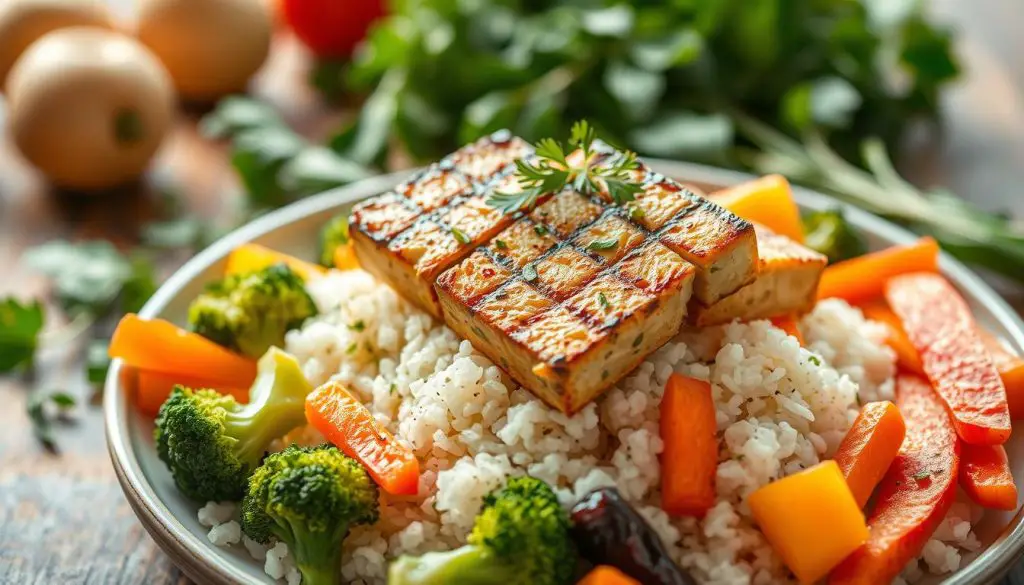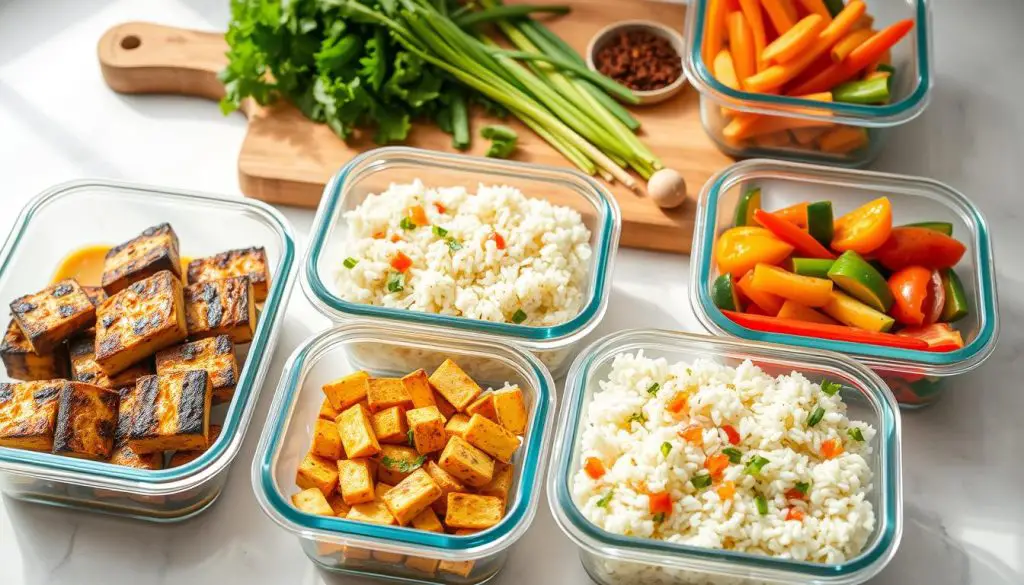Do you live with endometriosis? If yes, you know diet is key to managing symptoms. Grilled Tofu Rice is a tasty, endo-friendly meal. It has 270 calories, 16 grams of healthy fats, and 8 grams of plant-based protein.
This meal is not just good for you; it’s also anti-inflammatory. It’s made with ingredients that are low in FODMAPs and good for your gut. Every bite is packed with nutrients to help you feel better.
What is Endometriosis and How Does Diet Help?
Endometriosis is a chronic condition that affects up to 15% of women. It happens when tissue like the uterine lining grows outside the uterus. This tissue often grows on the ovaries, fallopian tubes, and other pelvic organs.
This can cause severe pelvic pain, heavy or irregular periods, painful sex, and digestive problems.
Understanding Endometriosis and Its Symptoms
The exact causes of endometriosis are not fully known. But it’s thought to be linked to too much estrogen, inflammation, and an overactive immune system. The misplaced tissue can bleed, swell, and cause scarring.
This leads to the symptoms we see in endometriosis.
The Role of Anti-Inflammatory Foods in Managing Endometriosis
There’s no cure for endometriosis, but an anti-inflammatory diet can help manage symptoms. Foods rich in nutrients can reduce inflammation and estrogen levels. This may help ease pain and other issues.
Endo-friendly foods include:
- Fruits and vegetables high in antioxidants, such as berries, leafy greens, and cruciferous vegetables
- Whole grains and legumes that are high in fiber and complex carbohydrates
- Fatty fish like salmon, mackerel, and sardines, which are rich in anti-inflammatory omega-3 fatty acids
- Nuts and seeds that provide healthy fats, fiber, and nutrients
Eating these anti-inflammatory foods can help reduce your endometriosis symptoms. It can also improve your overall health.
Benefits of a Plant-Based, Low-FODMAP Diet
For those with endometriosis, a plant-based, low-FODMAP diet can be very helpful. It focuses on foods that are anti-inflammatory and good for the gut. This can help reduce inflammation and lower estrogen levels, which are important in managing endometriosis symptoms.
Reducing Inflammation and Excess Estrogen
A plant-based diet is full of antioxidants and fiber. These are key in fighting inflammation and lowering estrogen levels. This can lead to less pain and other symptoms of endometriosis.
Also, a low-FODMAP diet can ease digestive problems common in endometriosis. It limits carbs that can cause stomach issues. This can help with bloating, pain, and other digestive problems.
| Key Benefits of a Plant-Based, Low-FODMAP Diet |
|---|
|
By choosing a plant-based, low-FODMAP diet, people with endometriosis can manage their condition better. It can also improve their overall health and well-being.
Nutrient-Dense Foods for Endometriosis Management
Eating a variety of nutrient-rich foods can really help those with endometriosis. Foods high in antioxidants like fruits and vegetables are key. Whole grains and legumes, rich in fiber, also offer vital nutrients for managing symptoms.
Antioxidant-Rich Fruits and Vegetables
Berries, leafy greens, and bell peppers are full of antioxidants. These fight inflammation and pain from endometriosis. They’re loaded with vitamins C and E, carotenoids, and flavonoids, helping to reduce oxidative stress.
Fiber-Rich Whole Grains and Legumes
Whole grains and legumes are also vital for endometriosis management. They help control estrogen levels and support digestion. Adding quinoa, brown rice, oats, beans, lentils, and peas to your diet can greatly benefit your health.
By choosing these nutrient-dense foods, we can help our bodies manage endometriosis symptoms better. They support overall health and well-being.
Incorporating Endo-Friendly Protein Sources
For those with endometriosis, eating enough protein is key. Red meat might make symptoms worse, but there are many endo-friendly protein sources you can add to your meals. These proteins help fix tissues and lower inflammation linked to endometriosis.
Lean meats like skinless chicken or turkey are good endo-friendly protein options. Fish and shellfish, like salmon and shrimp, are also great. They’re full of omega-3s that fight inflammation. Eggs are another versatile endo-friendly protein that can be used in many dishes.
If you’re on a plant-based diet, soy products like tofu are excellent endo-friendly protein choices. Legumes, including lentils and chickpeas, are also packed with plant-based protein. They help manage endometriosis symptoms. Nuts and seeds add a nutritious protein boost.
| Protein Source | Protein Content |
|---|---|
| Greek yogurt chicken salad | 16 grams per serving |
| Canned tuna in water | Over 40 grams per can |
| Salmon salad sandwich | 22 grams per 3-ounce serving |
| Edamame | High in plant-based protein |
| Lentil soup | Excellent source of protein |
Adding different endo-friendly protein sources to your diet helps your body stay healthy. It also helps manage endometriosis symptoms. Always talk to a healthcare expert for advice on managing your condition.

The Importance of Omega-3 Fatty Acids
Omega-3 fatty acids play a big role in managing endometriosis. These nutrients are powerful against inflammation. They can be a big help for those with this chronic condition.
Omega-3s are found in fatty fish, walnuts, and flaxseeds. They help reduce inflammation and can ease endometriosis symptoms. Studies show that women with endometriosis who eat more omega-3s feel less pain and discomfort.
Eating more foods rich in omega-3s is a good strategy for managing endometriosis. Try to add salmon, mackerel, sardines, chia seeds, and flaxseeds to your diet often. This way, you can get the anti-inflammatory benefits of these nutrients.
By focusing on omega-3 fatty acids, you support your body’s healing. This can help lessen the impact of endometriosis. Remember, a diet full of nutrients is key to managing endometriosis well.
Limiting Inflammatory Foods
Managing endometriosis isn’t just about eating foods that fight inflammation. We also need to avoid foods that can make symptoms worse. Two foods to watch out for are trans fats and processed foods.
Avoiding Trans Fats and Processed Foods
Trans fats, found in fried and processed foods, can cause inflammation. They can also mess with our hormones, making pain worse. Avoiding trans fats and eating less processed foods helps manage symptoms.
We should also avoid foods high in added sugars and refined carbs. These foods can make inflammation worse. Instead, eat foods that are naturally good for you.
By cutting down on inflammatory foods and focusing on a healthy diet, we can help manage endometriosis. This improves our overall health and well-being.

Endo friendly grilled tofu rice
Managing endometriosis can be easier with the right food choices. Our endo-friendly grilled tofu rice is a great option. Tofu is a plant-based protein that’s good for those with endometriosis. We marinate and grill it to make a tasty, anti-inflammatory, gluten-free, and low-FODMAP dish.
This recipe uses foods that are good for endometriosis. Bok choy and mushrooms help reduce inflammation. The dish is also easy to digest, which is key for those with digestive issues.
This meal is not just tasty but also full of nutrients. Eating a plant-based, anti-inflammatory diet can help ease endometriosis symptoms.
| Ingredient | Quantity |
|---|---|
| Extra-firm tofu, cubed | 1 block (14 oz) |
| Bok choy, chopped | 2 cups |
| Cremini mushrooms, sliced | 8 oz |
| Cooked brown rice | 2 cups |
| Sesame oil | 2 tablespoons |
| Low-sodium soy sauce | 2 tablespoons |
| Minced garlic | 2 cloves |
| Fresh ginger, grated | 1 tablespoon |
| Salt and black pepper | To taste |
Adding this endo-friendly grilled tofu rice to your meals can be very beneficial. It’s a delicious way to support your health and manage endometriosis symptoms.
Meal Prep and Recipe Ideas
Keeping a balanced anti-inflammatory diet can be tough. But, meal prep and recipe ideas can help. We have a variety of endo-friendly recipes. They feature anti-inflammatory ingredients for breakfast, lunch, and dinner.
Breakfast Options for Endometriosis Management
Begin your day with these endometriosis-friendly breakfast ideas:
- Oatmeal with Fresh Fruit – A bowl of hearty oats with berries or apples is full of fiber and vitamins.
- Vegetable-Packed Smoothie – Blend leafy greens, frozen fruit, and plant-based milk for a nutritious breakfast.
- Egg-Based Dishes – Scrambled, poached, or baked eggs with sautéed veggies are protein-rich and satisfying.
Lunch and Dinner Recipes with Anti-Inflammatory Ingredients
For lunch and dinner, try these anti-inflammatory recipes:
- Grilled or Baked Salmon – Salmon’s omega-3 fatty acids can help reduce inflammation.
- Plant-Based Protein Dishes – Tofu, lentils, and legumes are high in fiber and nutrients for endometriosis management.
- Antioxidant-Rich Vegetable Medleys – Roasting or sautéing colorful veggies makes for a nutrient-dense side or main dish.
By planning and preparing these endo-friendly dishes, you nourish your body. This helps manage your condition better.

Combining Diet with Exercise and Stress Management
A healthy diet is key for managing endometriosis symptoms. But, we also need to add regular exercise and stress management. This holistic approach helps improve our overall health and reduces endometriosis’ impact.
Exercise is a big part of managing endometriosis. Low-impact activities like walking, swimming, or cycling help reduce inflammation and boost mood. Strength training also helps build muscle and support weight management, which is important for those with endometriosis.
Stress management is just as important for those with endometriosis. Chronic stress can make symptoms worse and increase inflammation. Activities like meditation, yoga, or deep breathing exercises can help. They also improve sleep quality, which is vital for our well-being.
By combining a healthy diet with exercise and stress management, we can manage endometriosis symptoms better. This approach helps us regain control over our health and actively manage our condition.
Every person’s journey with endometriosis is different. It’s important to work with healthcare professionals to create a personalized treatment plan. By focusing on diet, exercise, and stress management, we can proactively manage this complex condition and improve our overall well-being.
To learn more about the benefits of a ketogenic diet and the treatment options for endometriosis and fibromyalgia, check out the additional resources provided.
Working with a Registered Dietitian
Working with a registered dietitian (RD) is very helpful for those with endometriosis. They can help you make a diet plan that’s full of nutrients and fights inflammation. They consider your health history, what you like to eat, and what you need.
They can spot any missing nutrients and suggest supplements. They also keep an eye on how well your diet is working.
With a registered dietitian, you can make a diet plan that really works for you. This is important because endometriosis affects everyone differently. Your diet needs will be unique too.
A registered dietitian who knows about endometriosis can guide you in choosing the right foods. This teamwork helps you manage your endometriosis better. You’ll learn how to take care of yourself in a way that’s backed by science.

There’s no single diet that works for everyone with endometriosis. But with a skilled registered dietitian, you can get a diet plan that’s just right for you. This plan will help you reach your health goals.
Potential Supplements for Endometriosis Relief
While changing your diet is key for managing endometriosis, some supplements can help too. Omega-3 fatty acids, vitamins C and E, zinc, and magnesium are good options. They may help with endometriosis relief.
But, always talk to a doctor or dietitian before taking any supplements. They can help you avoid any bad reactions or side effects. This way, supplements can be a useful addition to your treatment plan for endometriosis.
Studies suggest that certain supplements can help with anti-inflammatory and antioxidant effects. A 2022 study found that some supplements could help with endometriosis symptoms.
Remember, supplements are not a replacement for a healthy diet. Always check with a healthcare professional before adding any endometriosis relief supplements to your routine.
Combining dietary changes, lifestyle tweaks, and the right supplements can help manage endometriosis symptoms. It’s a journey that needs patience, trying different things, and working closely with your healthcare team. Together, you can find the best way to improve your health.
The Role of Phytoestrogens in Endometriosis
Phytoestrogens are compounds found in plants that act like estrogen in our bodies. They have a complex relationship with endometriosis. Some studies show they might help by reducing inflammation and balancing estrogen levels. Yet, other research has found mixed results.
The impact of phytoestrogens on endometriosis varies. It depends on the type and amount eaten, and our own estrogen levels. While more research is needed, adding foods rich in phytoestrogens like soy and flaxseeds might help some people with endometriosis.
Exploring the link between phytoestrogens and endometriosis requires an open mind. We need to understand both their possible benefits and limitations. This way, we can make smart choices about using these plant compounds in managing endometriosis.
Source Links
- https://www.everydayhealth.com/diet-nutrition/easy-recipes-to-whip-up-with-a-block-of-tofu/
- https://www.health.com/condition/endometriosis/endometriosis-diet
- https://drkathleenmahannah.com/blog/endometriosis-foods-to-eat-and-avoid
- https://health.clevelandclinic.org/endometriosis-diet
- https://www.abbeyskitchen.com/diet-for-endometriosis/
- https://www.verywellhealth.com/endometriosis-diet-7105372
- https://nzendo.org.nz/endo-news/low-fodmap-diet/
- https://www.healendo.com/blog-1/redmeat
- https://sofreshnsogreen.com/recipes/endometriosis-diet-recipes/
- https://dieteticallyspeaking.com/how-to-eat-well-with-a-chronic-illness/
- https://www.usenourish.com/blog/high-protein-lunch
- https://www.clairepettitt.com/blog/pcos-friendly-recipes-for-dinner-40-recipes-for-healthy-eating
- https://international-surrogacy.com/blog/boost-your-reproductive-health-with-a-fertility-diet-meal-plan
- https://www.kim-pearson.com/5-healthy-bbq-swaps/
- https://nurturefromwithin.com.au/endometriosis-management/
- https://thyroidpharmacist.com/articles/best-diet-for-hashimotos-hypothyroidism/
- https://www.ccrmivf.com/news-events/food-pcos/
- https://endoedibles.com/
- https://www.businessinsider.com/guides/health/conditions-symptoms/endometriosis-diet
- https://www.inovifertility.com/blog/fertility-meal-prep-ideas/
- https://www.acibademhealthpoint.com/healthy-endometriosis-recipes-for-relief-comfort/
- https://www.everydayhealth.com/diet-nutrition/diet/tofu-how-its-made-its-good-you-how-prepare-it/
- https://www.bbcgoodfood.com/health/wellness/pcos-is-there-a-role-for-diet-and-lifestyle
- https://www.crohnscolitisfoundation.org/sites/default/files/legacy/resources/diet-nutrition-ibd-2013.pdf
- https://www.endophysician.com/wp-content/uploads/2022/07/daily_meal_planning_guide.pdf
- https://www.foodrenegade.com/dangers-of-soy/
- http://www.bnutrition.co.uk/news
